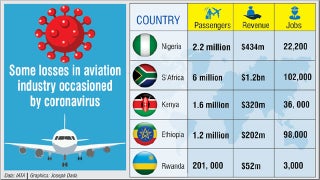Coronavirus spread now to cost airlines $113 billion

The International Air Transport Association (IATA) yesterday estimated financial impact of the novel coronavirus or covid-19, putting the loss at $113 billion.
The new figure was released following a review of financial implication on the public health emergency on the global air transport industry. Just two weeks ago, IATA was expecting lost sales in the range of $30 billion.
The association had said Airlines in Nigeria and other African countries would lose $40 million in revenue this year over flight disruption due to coronavirus spread. The figure is also expected to rise with the spread and new findings.
IATA now sees 2020 global revenue losses for the passenger business of between $63 billion – in a scenario where covid-19 is contained in current markets with over 100 cases as of March 2 – and $113 billion, in event of a broader spread. No estimates are yet available for the impact on cargo operations.
Since the first estimate, the virus has spread to over 80 countries and forward bookings have been severely impacted on routes beyond China.
Financial markets have reacted strongly. Airline share prices have fallen nearly 25 per cent since the outbreak began, some 21 percentage points greater than the decline that occurred at a similar point during the SARS crisis of 2003. To a large extent, this fall already prices in a shock to industry revenues much greater than our previous analysis.
IATA’s Director General and Chief Executive Officer (CEO), Alexandre de Juniac, said the turn of events as a result of covid-19 is almost without precedent.
“In little over two months, the industry’s prospects in much of the world have taken a dramatic turn for the worse. It is unclear how the virus will develop, but whether we see the impact contained to a few markets and a $63 billion revenue loss, or a broader impact leading to a $113 billion loss of revenue, this is a crisis.
“Many airlines are cutting capacity and taking emergency measures to reduce costs. Governments must take note. Airlines are doing their best to stay afloat as they perform the vital task of linking the world’s economies. As governments look to stimulus measures, the airline industry will need consideration for relief on taxes, charges and slot allocation. These are extraordinary times,” de Juniac said.
Airlines in Europe and Asia would bear the brunt of the pain. Carriers in Asia Pacific could lose out on sales worth $58 billion.
There are already more than 94,000 confirmed cases of the novel coronavirus worldwide, and nearly 3,300 deaths, mostly in China. South Korea, Japan, Italy and Iran also already suffering major outbreaks.
Travel restrictions and a lack of demand from customers have encouraged dozen of major airlines to cancel flights to and from mainland China because of the coronavirus. Transatlantic flights, as well as capacity on routes within Europe and the United States, have also been curtailed.
Struggling UK carrier Flybe collapsed earlier Thursday as the slump in demand killed off hopes of a government-backed rescue. Scottish airline Loganair said it would take over 16 of Flybe’s routes over the coming months. Analysts say Flybe is unlikely to be the last casualty.
Managing Director at Fitch Ratings, Josef Pospisil, said that most big airlines have strong enough balance sheets to weather the shock to demand caused by coronavirus. But smaller carriers, especially those based in Asia, are more vulnerable.
“There probably will be some small players, regional players, that may be hit really hard,” he said.
Weak airlines that aren’t able to secure backing from investors or governments could suffer the same fate as Flybe or become takeover targets, especially in Europe, where industry consolidation is underway.
Investors have punished airlines stocks in recent weeks. United Airlines (UAL) stock is down 32 per cent so far this year, for example, and shares in Germany’s Lufthansa (DLAKF) are down 29 per cent over the same period.
Lufthansa said Thursday it has canceled 7,100 European flights for March, mostly within Germany or on routes to Italy, accounting for about 25 per cent of its total capacity. Earlier this week, Lufthansa said it would ground 150 of its 770 aircraft.








